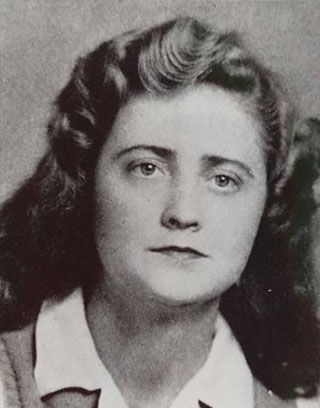
Amanda Leigh Etheridge was an outstanding student leader during a time of extraordinary unrest at the highest levels of administrative authority at East Carolina Teachers College. Her unrelenting calls for free student expression through mass meetings on campus, along with her support for academic justice for several faculty dismissed earlier by the fallen and convicted president Leon Meadows, led to her being asked to leave the school by interim president Howard McGinnis. Although Etheridge had been “a remarkably versatile and talented student” who had “demonstrated singular leadership ability” since her arrival in 1942, she obliged, regretfully withdrawing even as she expressed “sincere hope for the progressive development of East Carolina Teachers College.” In forcing her departure, East Carolina, as led by McGinnis, did a profound disservice to the cause of student leadership on campus. Although the move did not stop Etheridge from excelling elsewhere, East Carolina forfeited the chance to have played a more positive role in the cultivation of a remarkably talented and promising student.
By all counts, Etheridge had been a stellar student and an outstanding athlete – playing on the field hockey, soccer, volleyball, tennis, softball, and basketball teams from her freshman through her junior years. Active in student government, Etheridge was elected, during the spring of 1943, her freshman year, secretary of the newly organized Student Cooperative Government Council. In March 1944, Etheridge was one of the student leaders who signed a petition to Governor Broughton objecting to the ECTC Board of Trustees’ decision to exonerate Leon Meadows. The following year, her junior year, Etheridge was elected student body president.
According to Mary Jo Bratton’s study of university history, ECTC soon undertook “efforts to curb her [Etheridge’s] leadership.” When Etheridge failed to sign out of her dormitory before leaving campus to visit a faculty member, the women’s judiciary council removed her social privileges. Etheridge was also removed from office as student body president for the same infraction and placed on permanent probation. A file of her other misconduct included offenses such as swimming in the Tar River on Thanksgiving Day and cleaning tennis courts on a Sunday. Nevertheless, Etheridge, with clear backing from the student body, was elected editor of the Techo Echo, the student newspaper, for 1945-1946, her senior year. Shortly after, during the summer of 1945, interim President McGinnis personally wrote Etheridge asking her to complete her education elsewhere. The reason given was that “during the past college year … you were out of sympathy with the official administration of East Carolina Teachers College.” Sixteen other student leaders faced the same fate.
A native of Manteo, Etheridge transferred to Peabody College (now Vanderbilt University) in Tennessee where she completed a B.A. in 1946, and an M.A. in 1947. From 1948 to 1952, Etheridge taught at Mankato State Teachers College in Minnesota – the first public college in the U.S. led by a woman president. In 1952, she was one of the first recipients of a Fulbright Scholarship. Through the Fulbright, Etheridge taught in Amsterdam where she met and later married Richard C. Salet. The couple had three daughters before the marriage ended in divorce. Following her time in Amsterdam, she worked as a psychologist for twelve years at Minnesota’s St. Peter State Hospital, a psychiatric institution, there assisting in the development of a personality test, the Minnesota Multiphasic Personality Inventory, that remains in use today. Although she returned to ECU in 1975 as a part-time student, the school never recognized her for the integrity in leadership she displayed in devotion to the ideals student government. She passed away, in Dare County, in 1977, age 52.
Sources
- Bratton, Mary Jo Jackson. East Carolina: The Formative Years, 1907-1982. Greenville, NC: East Carolina University Alumni Association, 1986.
- “ECTC Plans Program for New Students.” Rocky Mount Telegram. September 26, 1944. P. 8.
- Ferrell, Henry C., Jr. No Time for Ivy: East Carolina University, 1907-2007. Greenville: East Carolina University, 2006.
- H. J. McGinnis to Amanda Etheridge, July 12, 1945, and Etheridge to McGinnis, July 18, 1945. ECU Archives. Joyner Library, East Carolina University.
- Records of Howard Justus McGinnis Tenure as Interim President of East Carolina Teachers College. UA02-03. University Archives, J. Y. Joyner Library, East Carolina University.
- Records of Leon Renfroe Meadows’ Tenure and Administration. UA02-02. University Archives, J. Y. Joyner Library, East Carolina University.
- The Teco Echo, Vol 19, no. 9, 12, and Vol. 20, no. 6. East Carolina University Campus Newspapers. UA50-05. University Archives, J. Y. Joyner Library, East Carolina University.
- The Tecoan. 1943, 1944, 1945. Greenville: East Carolina University.
- “Whatever Happened to Amanda Etheridge?” East: The Magazine of East Carolina University. Spring 2011. Vol. 9, no. 3. Pp. 59-60.
Additional Related Material






Citation Information
Title: Amanda Etheridge
Author: John A. Tucker, PhD
Date of Publication: 7/1/2019